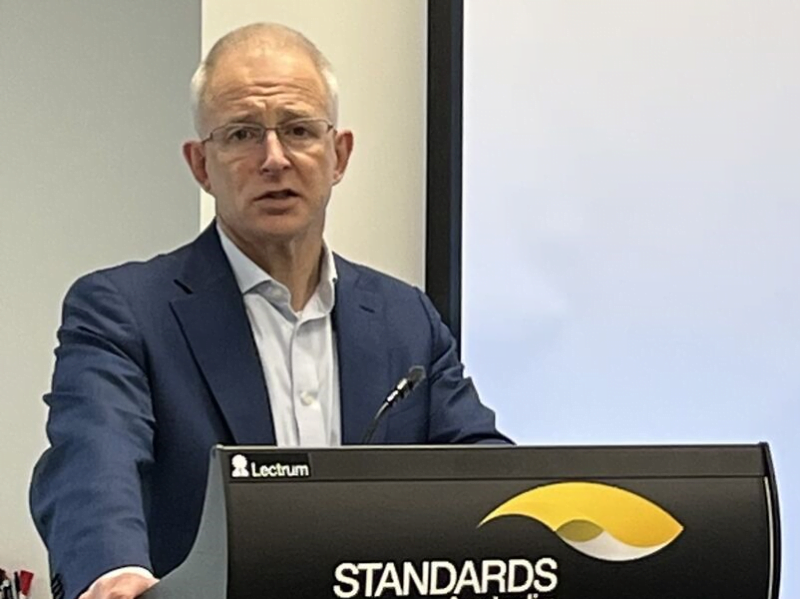The federal government is focused too much on regulating artificial intelligence and not enough on the “real public policy issue” of building local AI skills, according to shadow minister for government services and the digital economy Paul Fletcher.
Mr Fletcher said the federal government needs to work to ensure the country has “enough AI expertise and in turn AI-leveraging economic activity in Australia” across all industries, not just tech-related companies.
The comments were made during an address to the NSW government Taskforce on Data, Digital and AI, which was set up by former NSW digital minister Victor Dominello prior to his departure from politics this year.
Mr Fletcher used the speech to highlight figures from University of Adelaide Professor Anton van den Hengel that show less than 200 PhDs focused on AI are produced annually, which he said is evidence of an AI skills shortage in Australia.
In the United States, around 3,000 international PhD students in AI-related fields graduate in any given year, with most staying in the US following completion of their studies, according to researchers at Georgetown University in 2019.
According to the 2023 AI Index Report, produced by researchers at Stanford University, about 360 of the 1,893 Computer Science PhDs students that graduated in the United States in 2021 specialised in Artificial Intelligence.

The federal government recently completed consultation on how to support safe and responsible use and development of AI in Australia, but is yet to release its position on a way forward.
While the development of a risk-based approach to AI use-cases has been welcomed, the Kingston AI Group’s submission – representing a dozen Australian Professors of AI – notes that Australia requires the “capacity to create, understand, and control the technology” to ensure it can be safely and responsibly deployed.
The submission calls on the government to “substantially and urgently increase investment” in AI research to fill the “major deficit in AI expertise”. It noted that Australia “produces insufficient numbers of PhD graduates in AI for the public service, let alone the rest of the economy”.
To help shift the public policy focus from increasing regulation to boosting AI skills, Mr Fletcher said there is a need to “demonstrate the public benefits of AI, and that it’s not taking jobs but rather allowing the humans to be redeployed to their highest value uses”.
“In the healthcare sector, for example, AI algorithms can mine medical records, design treatment plans or create drugs much faster than current offerings,” Mr Fletcher said.
“AI is increasingly used to help radiologists interpret scans more quickly and accurately and in larger volumes. In recent months I have met with both Australian company Harrison.ai and Australian researcher Prof Michael Barrett about the work each of them is doing in this area.”
According to a report by The Tech Council of Australia and Microsoft, generative AI tools alone could add up to $115 billion to the Australian economy by 2030. Mr Fletcher emphasised the opportunity to use AI to boost the productivity of governments, “which today frankly is a black hole”.
One of the barriers to technology uptake in government agencies is a lack of an effective coordinator of digital programs, according to Mr Fletcher.
“Politicians play a primary role in setting frameworks, but the purchase decisions are typically made by Department Secretaries or CIOs – or panels of such people – in the public service,” Mr Fletcher said.
“A feature of the Commonwealth system is that it is very decentralised – individual CIOs of agencies such as the ATO and Defence are powerful. They make significant procurement and purchasing decisions, with limited central influence.
“The Digital Transformation Agency was supposed to set priorities centrally – but the power of individual departments meant that it largely failed. This is a key factor behind digital service delivery at a Commonwealth level lagging NSW by a considerable margin.”
If the private sector wants to achieve its public procurement objectives, Mr Fletcher said businesses need to engage with several government portfolios “at both the political and bureaucratic levels” including parliamentary committees, inquiries run by departments, and reviews led by independent experts.
“While you may have a simple proposal, you may be surprised at how many agencies have skin in the game,” Mr Fletcher said.
He also urged the tech sector to “try and find MPs who can be champions for your causes” and that engaging with the government before a formal procurement process has begun is “often the most fruitful”.
“If there’s a discussion paper stage – and in my view this is almost always good practice for government – then pitch your ideas at that stage, to help shape what government then goes to market to procure,” Mr Fletcher said.







